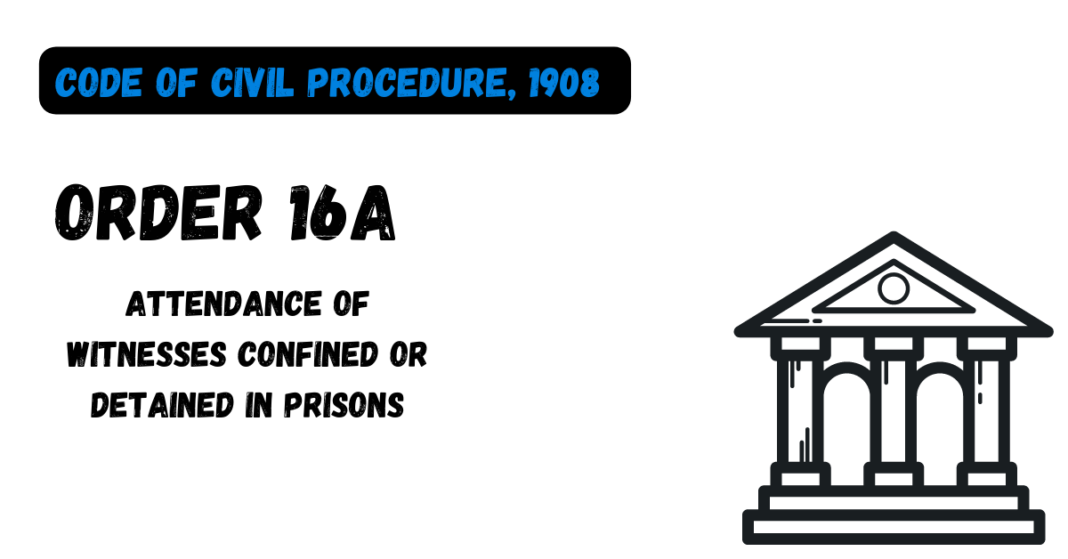1. Definitions.—In this Order,—
(a) “detained” includes detained under any law providing for preventive detention;
(b) “prison” includes—
(i) any place which has been declared by the State Government, by general or special order, to be a subsidiary jail; and
(ii) any reformatory, borstal institution or other institution of a like nature.
2. Power to require attendance of prisoners to give evidence.—Where it appears to a Court that the evidence of a person confined or detained in a prison within the State is material in a suit, the Court may make an order requiring the officer in charge of the prison to produce that person before the Court to give evidence:
Provided that, if the distance from the prison to the Court-house is more than twenty-five kilometers, no such order shall be made unless the Court is satisfied that the examination of such person on commission will not be adequate.
3. Expenses to be paid into Court.—(1) Before making any order under rule 2, the Court shall require the party at whose instance or for whose benefit the order is to be issued, to pay into Court such sum of money as appears to the Court to be sufficient to defray the expenses of the execution of the order, including the travelling and other expenses of the escort provided for the witness.
(2) Where the Court is subordinate to a High Court, regard shall be had, in fixing the scale of such expenses, to any rules made by the High Court in that behalf.
4. Power of State Government to exclude certain persons from the operation of rule 2.—(1) The State Government may, at any time, having regard to the matters specified in sub-rule (2), by general or special order, direct that any person or class of persons shall not be removed from the prison in which he or they may be confined or detained, and thereupon, so long as the order remains in force, no order made under rule 2, whether before or after the date of the order made by the State Government, shall have effect in respect of such person or class of persons.
(2) Before making an order under sub-rule (1), the State Government shall have regard to the following matters, namely:—
(a) the nature of the offence for which, or the grounds on which, the person or class of persons have been ordered to be confined or detained in prison;
(b) the likelihood of the disturbance of public order if the person or class of persons is allowed to be removed from the prison; and
(c) the public interest, generally.
5. Officer in charge of prison to abstain from carrying out order in certain cases.—Where the person in respect of whom an order is made under rule 2—
(a) is certified by the medical officer attached to the prison as unfit to be removed from the prison by reason of sickness or infirmity, or
(b) is under committal for trial or under remand pending trial or pending a preliminary investigation; or
(c) is in custody for a period which would expire before the expiration of the time required for complying with the order and for taking him back to the prison in which he is confined or detained; or
(d) is a person to whom an order made by the State Government under rule 4 applies, the officer in charge of the prison shall abstain from carrying out the Court’s order and shall send to the Court a statement of reasons for so abstaining.
6. Prisoner to be brought to Court in custody.—In any other case, the officer in charge, of the prison shall, upon delivery of the Court’s order, cause the person named therein to be taken to the Court so as to be present at the time mentioned in such order, and shall cause him to be kept in custody in or near the Court until he has been examined or until the Court authorises him to be taken back to the prison in which he is confined or detained.
7. Power to issue commission for examination of witness in prison.—(1) Where it appears to the Court that the evidence of a person confined or detained in a prison, whether within the State or elsewhere in India, is material in a suit but the attendance of such person cannot be secured under the preceding provisions of this Order, the Court may issue a commision for the examination of that person in the prison in which he is confined or detained.
(2) The provisions of Order XXVI shall, so far may be, apply in relation to the examination on commission of such person in prison as they apply in relation to the examination on commission of any other person.





